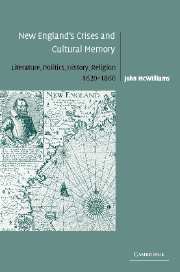Book contents
- Frontmatter
- Contents
- Acknowledgments
- Introduction: Crisis rhetoric: exclusion in New England history
- PART ONE PLANTATION AND SETTLEMENT
- PART TWO TIME OF TROUBLES
- PART THREE REVOLUTION
- Headnote
- 7 Boston revolt and Puritan restoration: 1760–1775
- 8 Shots heard round the world
- 9 Abolition, “white slavery,” and regional pride
- Epilogue: “bodiless echoes”
- Notes
- Index
9 - Abolition, “white slavery,” and regional pride
Published online by Cambridge University Press: 22 September 2009
- Frontmatter
- Contents
- Acknowledgments
- Introduction: Crisis rhetoric: exclusion in New England history
- PART ONE PLANTATION AND SETTLEMENT
- PART TWO TIME OF TROUBLES
- PART THREE REVOLUTION
- Headnote
- 7 Boston revolt and Puritan restoration: 1760–1775
- 8 Shots heard round the world
- 9 Abolition, “white slavery,” and regional pride
- Epilogue: “bodiless echoes”
- Notes
- Index
Summary
Is liberty safe? Is man saved? They say, sir, I am a fanatic, and so I am. But sir, none of us have yet risen high enough. Afar off, I see Carver and Bradford, and I mean to get up to them.
Wendell Phillips, 1855I regard you as providentially raised up to be the James Otis of the new revolution.
William Lloyd Garrison to Wendell Phillips, 1857Although Angelina Grimké's “Appeal to the Christian Women of the South” (1836) arrayed the Bible and the Declaration of Independence against chattel slavery with a moral force hard to excel, Grimké had precious little regional tradition to sustain her demand for emancipation. There had been numerous antislavery Southerners and some Colonizationists, but there were precious few southern Abolitionists, and virtually no Abolitionists of the uncompensated, immediatist persuasion like those who, for the preceding five years, had been following the Garrisonian banner. Accordingly, Grimké's appeal had to be profoundly ahistorical, based upon the presumably timeless divine commands imbedded in the two scriptural texts, one religious and one political, that were most widely valued by Americans on both sides of the line of the Missouri Compromise.
In Massachusetts the argumentative resources for abolition were at once broader than Grimké's and oddly narrower, evolving almost as much from a selective reading of regional history as from Jefferson and Jesus.
- Type
- Chapter
- Information
- New England's Crises and Cultural MemoryLiterature, Politics, History, Religion, 1620–1860, pp. 258 - 292Publisher: Cambridge University PressPrint publication year: 2004



